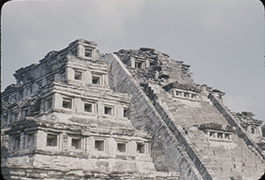
Piramide con nichos., 1947
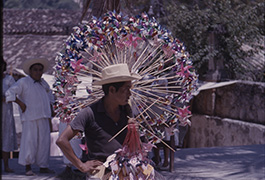
Venta de reguiletes., 1963
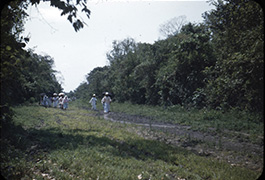
Wedding Party Reaches Tajin From Papantla, 1948
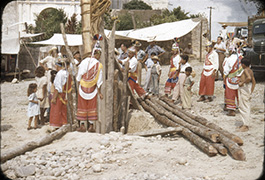
Voladores, al pie del palo, Corpus., 1948
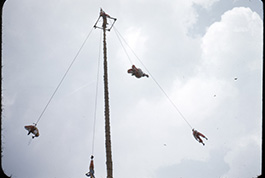
Voladores, ''volando,'' Corpus, 1948
![[Corpus Christi Festival], 1948](/-/media/Site/Libraries/digital-collections/itk/itk_slideshow_corpus.jpg)
[Corpus Christi Festival], 1948
About the Collection
Holding library: DeGolyer Library
View more collections held by DeGolyer Library
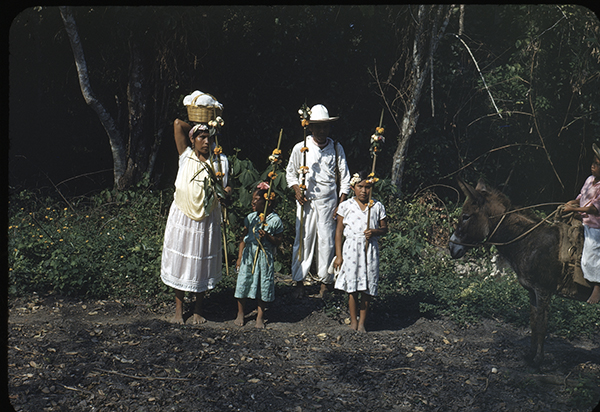 Overview
Overview
The Isabel T. Kelly Ethnographic Archive is held by the DeGolyer Library, and consists of field note sheets, folders of data, manuscripts, maps, photographs, negatives, slides, film, charts, tables, and secondary source copies. These materials come from research trips in the United States to study the Coast Miwok and Southern Paiute tribes, and trips to Mexico, Bolivia, Puerto Rico, El Salvador, and Pakistan.
Isabel Truesdell Kelly (1906-1983) was a social anthropologist and archeologist who specialized in Mexican cultures working in a non-traditional career path for women. She was born in Santa Cruz, California and developed a scholarly interest in anthropology while an undergraduate at the University of California, Berkeley (UCB). Kelly entered UCB at sixteen and earned a BA (1926), MA (1927), and PhD (1932) in anthropology. Students received no real practice in the field; however, she was able to go out in 1929 with professor Alfred L. Kroeber and other academics to Pecos near Santa Fe which was a turning point in her development as a scholar. She conducted fieldwork in 1931-1932 with the Coast Miwok.
From 1932-1934, she did ethnographic research with the Southern Paiute Indians. She then went to Mexico as a research associate working with geographer Carl O. Sauer and Kroeber in 1935 working in Culiacan, Sinaloa. Kelly was an indefatigable field worker, often in rigorous conditions considered challenging for many. With minimal funding from UCB's Anthropology Department, Kelly returned to Mexico for archeological studies in 1939. She became a Mexican resident in 1940, settling in Tepepan, outside Mexico City. In 1946, Kelly became Ethnologist-in-Charge of the Smithsonian's Institute of Social Anthropology (ISA) at the Mexico City office. Kelly taught and conducted research among the Totonac people at El Tajin in Veracruz. She also studied health care in Mexico and El Salvador. 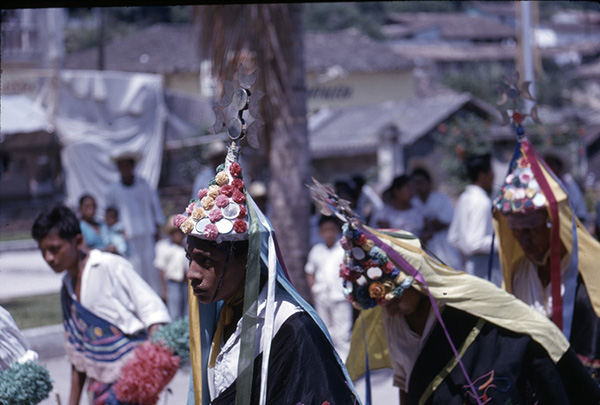
From 1952-1960, Kelly worked with the Institute of Inter-American Affairs (IIAA), later called the Agency for International Development. She worked in Mexico, Bolivia, Puerto Rico, El Salvador and Pakistan. Sponsored by the Rockefeller Foundation and others, she returned to research in Mexico in 1960. Isabel Kelly endured many seasons of difficult fieldwork and has been considered the “mother of Western Mexican archaeology.”
The Isabel T. Kelly Ethnographic Archive digital collection consists of a small sampling of the approximately 100,000 5 x 8-inch field note sheets/cards, 39 field note journals, 300 charts, tables and data computations, 500 file folders (original data and synthesis of data), 3,000 photographic prints and slides, 200 negatives, 550 maps, 300 publications, copies and reprints of secondary materials, ca. 1926-1980.
A finding aid for the full Isabel T. Kelly Ethnographic Archive collection is available in TARO.
Copyright usage terms vary throughout the collection. Each item contains information about usage terms. If SMU does not have the right to publish the item on the Internet, only the item's metadata will be available and the digitized object will be available on a restricted access basis. Such items may only be viewed on campus. When items are available for use, please cite DeGolyer Library, Southern Methodist University. A high-quality version of these files may be obtained for a fee by contacting degolyer@smu.edu.